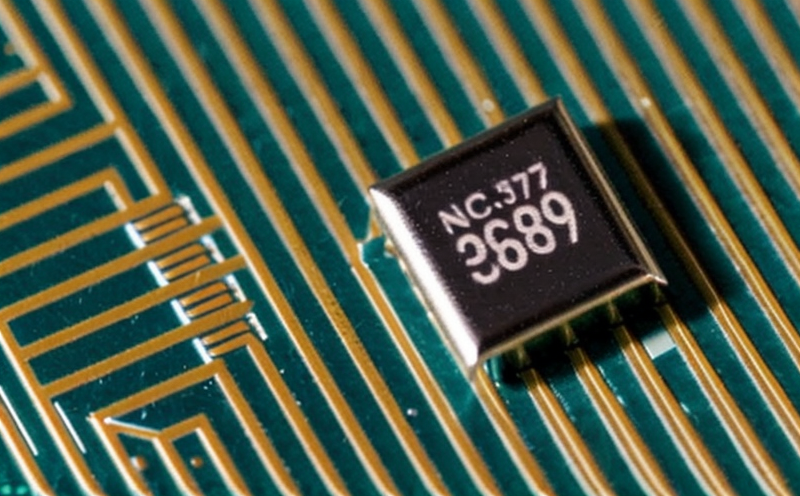JEDEC JESD22-A120 Energy Dissipation Capacity Testing
The JEDEC JESD22-A120 test is a critical procedure used in the semiconductor and microchip industry to evaluate the energy dissipation capacity of devices. This testing ensures that microchips can withstand the high-power pulses required for their operation without sustaining damage, thus enhancing product reliability and extending lifetime.
The JESD22-A120 test is particularly important because it simulates real-world conditions where a device may need to dissipate large amounts of energy in a short time. This includes scenarios such as startup currents, transient surges, or fault conditions. The test helps manufacturers and quality assurance teams ensure that their products can perform reliably under these stressors.
The procedure involves subjecting the microchip to controlled power pulses designed to exceed the normal operating current by up to 50%. This is done using a high-voltage pulse generator connected through an appropriate load. The goal is to observe how the device responds and if it can recover without failure or degradation in performance.
The test setup typically includes the following components:
- High-voltage pulse generator
- Load resistor (to simulate real-world conditions)
- Temperature-controlled chamber for accurate testing under various ambient temperatures
- Measurement instruments to monitor current, voltage, and power dissipation
The test is performed in accordance with the JESD22-A120 standard which specifies detailed procedures for applying controlled energy pulses. The pulse parameters include:
- Pulse width: 5 µs ± 1 µs
- Repetition rate: 1 Hz to 100 Hz (as specified in the test method)
- Voltage range: 20 V to 300 V, depending on the device being tested
The testing process involves multiple cycles of energy pulses. The number of cycles can vary based on the specific requirements set by the manufacturer or regulatory bodies. For example, a typical test might involve 100 pulse cycles at a specified frequency.
After the test, detailed analysis is conducted to ensure that the microchip has not been damaged and is still functioning as expected. Key parameters measured include:
- Voltage across the device
- Current through the device
- Power dissipation
- Temperature rise during testing
The results of these tests are crucial for ensuring that the microchip can operate reliably under stress conditions. This is particularly important in high-performance computing, automotive electronics, and aerospace applications where reliability is paramount.
By using JESD22-A120 testing, manufacturers can identify potential weaknesses early in the development process, allowing for corrective actions to be taken before product release. This not only enhances product quality but also reduces warranty costs and improves customer satisfaction.
Applied Standards
The JEDEC JESD22-A120 Energy Dissipation Capacity Testing is governed by the JEDEC standard, which ensures that testing procedures are consistent across different manufacturers and laboratories. This standardization is crucial for ensuring accuracy and repeatability in testing results.
The JESD22-A120 standard specifies:
- Test setup requirements
- Pulse parameters (voltage, pulse width, repetition rate)
- Data collection methods
- Acceptance criteria for passing the test
In addition to JESD22-A120, other relevant standards include:
- IEC 62471: Lighting equipment - Classification of degrees of danger from electric shock and resulting measures
- EN 50389-1: Electromagnetic compatibility (EMC) - Immunity requirements for household appliances, equipment and similar apparatus - Part 1: General
The use of internationally recognized standards ensures that the testing process is consistent with global best practices. This not only enhances product quality but also facilitates international trade by ensuring that products meet regulatory requirements in different markets.
Industry Applications
- Automotive Electronics: Ensuring microchips can withstand high-power pulses during startup and fault conditions. This is critical for the safety systems in cars.
- Aerospace: Testing microchips used in avionics to ensure they can operate reliably under extreme environmental conditions.
- Data Centers: Evaluating the robustness of microchips that power servers and storage devices, ensuring high availability and performance.
- Telecommunications: Ensuring the reliability of microchips used in network equipment to withstand transient surges and other stressors.
The JESD22-A120 test is a vital part of the quality assurance process for these industries. By identifying potential issues early, manufacturers can improve product performance and reduce downtime, leading to significant cost savings and enhanced customer satisfaction.
Customer Impact and Satisfaction
The JESD22-A120 test plays a crucial role in enhancing the reliability and lifetime of microchips. This is particularly important for customers who rely on high-performance electronics, such as:
- Manufacturers of automotive components
- Aerospace companies developing avionics systems
- Data center operators providing cloud services
- Telecommunications providers ensuring network reliability
The test results provide assurance that the microchips will perform reliably under stress conditions. This not only improves product quality but also reduces warranty claims and customer dissatisfaction. In addition, by identifying potential issues early in the development process, manufacturers can improve product performance and reduce costs associated with field failures.
For quality managers and compliance officers, JESD22-A120 testing is a critical tool for ensuring that products meet regulatory requirements and industry standards. This helps to build trust with customers and stakeholders, enhancing overall customer satisfaction.





